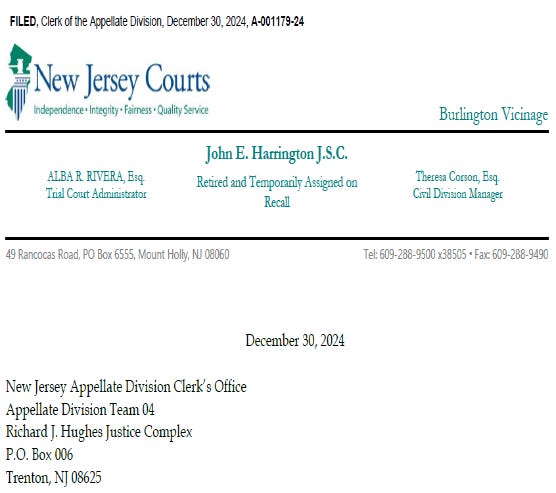COURT ON ELECTION: ITS OVER
PLAINTIFF DID NOT ESTABLISH REASONABLE PROBABILITY OF SUCCESS ON MERITS
Sayke Reilley’s emergent motion for a stay of Judge Harrington’s order was today denied by the Superior Court Of New Jersey, Appellate Division.
This after Judge Harrington submitted a 21-page “amplification” to the Appellate Division regarding his December 3, 2024 decision to certify the Mount Holly Council race.
The appellate court left an opening for Mr. Reilley to appeal to the State Supreme Court, but The Reporter has confirmed that further appeal will not occur.
Harrington’s “amplification” did not repeat his previous critical observation regarding the 2013 referendum. “The 2013 referendum question was approved by the voters. The Ordinance repealed all previous Ordinances. Therefore, §3-1 of the Code of the Township of Mount Holly reference to §17 (Regular Municipal Elections) is inconsistent and was repealed. There was no challenge to Ordinance No. 2013-8 or the referendum. The Ordinance is presumed to be valid and governed all future elections.”
Harrington went on to support his decision with the following discussion about the 2023 referendum.
“In 2023, the Township of Mount Holly amended its Plan by referendum…to return to Non-Partisan Regular Municipal Elections. The 2023 referendum Question and Interpretive Statement were silent regarding runoff elections.” Municipalities are permitted “to adopt Non-Partisan Regular Municipal Elections without runoff elections.”
“If a runoff election is deemed to be needed by the municipality, a referendum question is required... The failure to ask such a question means that there are no runoffs required in the Township of Mount Holly. An analysis of the statutes and applicable case law supports the Court’s reasoning.”
Harrington’s amplification ended with the following summary reprinted in full below.
“CONCLUSION In 1953, the Township of Mount Holly adopted a form of municipal government that required runoff elections. The Township of Mount Holly, by way of its 2013 Ordinance and referendum question, appropriately amended its Charter to provide for the selection of its governing body members by way of a General Election format. This Plan amendment, by virtue of N.J.S.A. 40:69A-208.2 and N.J.S.A. 40:45-20 eliminated the protection of a runoff election. Runoff elections are no longer mandated in the Faulkner Act and, therefore, to require a runoff election the governing body was obligated to adopt an Ordinance and propose a referendum question pursuant to N.J.S.A. 40:45-21. Such a question was not provided at the 2023 General Election and, therefore, a runoff is not required.”



